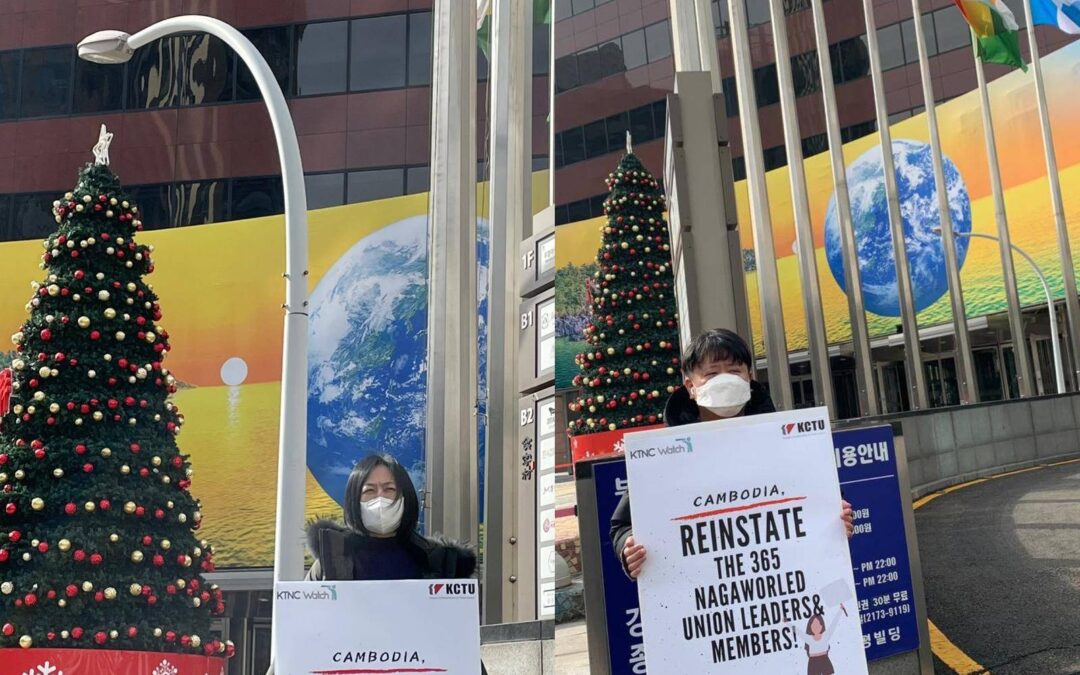
Feb 10, 2022
Eight union leaders jailed for peacefully walking a picket line at NagaWorld Hotel and Casino in Cambodia have been denied pre-trial release, and government officials are now using the COVID-19 pandemic to further interfere with workers’ right to assemble, according to the Labor Rights Supported Union of Khmer Employees of NagaWorld union (LRSU).
The imprisoned union leaders, including union president Sithar Chhim, who was violently taken away by plain clothes police while attempting to join her colleagues on the picket line, say they do not have enough water and are not allowed to contact their families.
During a raid on union offices December 31, police arrested union leaders and seized computers and phones. The leaders are charged with incitement, which carries a sentence of up to five years in prison.
(Send a message to the Cambodian prime minister asking for union leaders’ immediate release.)
Crackdown on Strikers
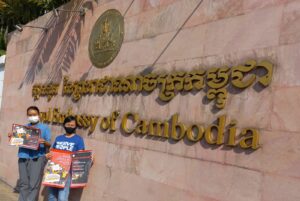
Activists in Bangkok stand in support of striking NagaWorld workers at the Cambodian Embassy, Credit: Thai labor activists
As workers entered their tenth week walking the picket line February 4, the government demanded the strikers leave to take COVID-19 tests, despite the lack of mass COVID-19 testing elsewhere in Cambodia. Recent photos show government officials at maskless social events where COVID-19 tests were not required.
After workers refused to leave the picket line, authorities sent doctors and medical staff to test those on strike, not allowing them to leave until they took a test. More than 700 workers have now been tested, and with four positive COVID-19 cases, LRSU has since suspended the strike for 10 days.
Three NagaWorld workers were detained for allegedly obstructing implementation of the Law on Measures to Prevent the Spread of COVID-19 and other Serious, Dangerous and Contagious Diseases. They were interrogated for days and must appear before a court this week. The LRSU is calling out the government for using legal intimidation to stop a peaceful strike.
In addition, a striker’s husband was detained and taken to the police station because he had been taking photos of authorities. He says he was forced to sign an agreement promising not to take photos of authorities in the future before he was released.
Global Support for NagaWorld Workers
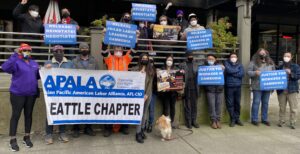
Members of the Asian Pacific American Labor Alliance in Seattle joined solidarity events to support NagaWorld workers. Credit: APALA, Seattle Chapter
Thousands of slot machine workers, dealers, housekeepers and technicians went on strike in late November, demanding the reinstatement of 365 employees who were fired in April. While management asserts the layoffs were due to COVID-19, union leaders say those laid off were all union leaders and activists.
Workers also want the company to provide seniority bonuses and pay, per the law, and a 7 percent raise on their base salary to keep up with inflation. They also are calling for NagaWorld to stop exploiting workers under the premise of internships.
The workers’ strike has gained global support, as global unions, human rights organizations and others have demanded they be allowed to freely exercise their rights to peacefully assemble, strike and form unions.
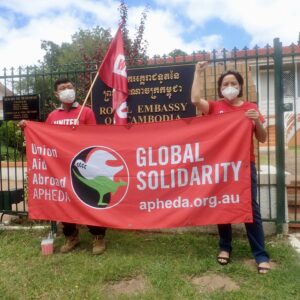
In Canberra, Australia, activists joined the Day of Action in support of NagaWorld workers. Credit: APHEDA
During a ”Global Day of Action” February 7, solidarity events took place at Cambodian embassies and consulates in 11 cities on four continents. The action coincided with NagaCorp’s board meeting where, despite the corporation’s claims it fired workers due to slowing business during the pandemic, company leaders stressed it is a very strong financial position, with higher than predicted revenue, and that the business is returning to profitability
Global Day of Action participants submitted letters to the consulates that condemned the actions of NagaWorld and the Cambodian government, reiterated the union’s demands and expressed solidarity with LRSU and its members. The Asian Pacific American Labor Alliance, Solidar Suisse, Building and Wood Worker’s International, IUF global union, APHEDA and other unions and labor rights organizations around the world, coordinated the actions in seven countries.
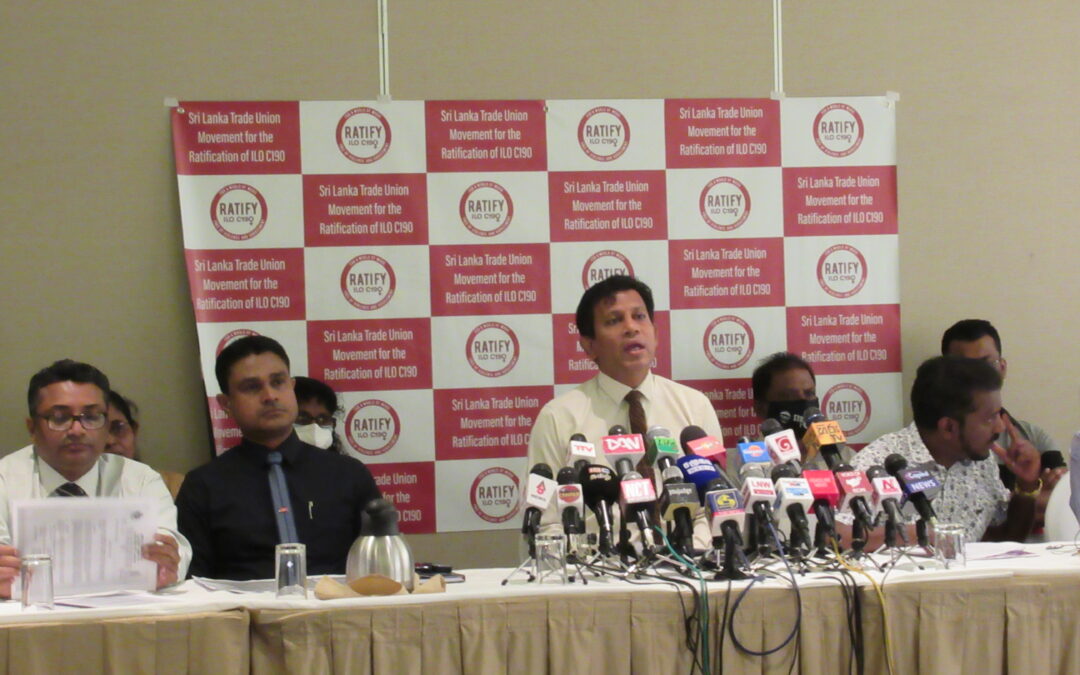
Feb 7, 2022
Unions in Sri Lanka are urging the government to follow through with its promise to ratify a global treaty to end gender-based violence and harassment in the world of work by March 2022.
The Sri Lanka Trade Union Movement for the Ratification of ILO C190 in Sri Lanka, comprised of 17 trade union leaders from the public and private sectors, held a press conference in recent days to call out the government for deliberately delaying the ratification process.
International Labor Organization Convention 190 (C190) is the first international treaty that addresses violence and harassment at work. The ILO adopted it in 2019 during its annual meeting in Geneva.
“There is no point in raising your hand in Geneva, only to lower your hand in Sri Lanka,” Saman Rathnapriya, chairman of the Government Nursing Officers Association said at the press conference.
“Create a proper working environment in the country. A conducive working environment does not exist in this country.”
Union leaders noted that Sri Lanka’s Labor Minister Nimal Siripala De Silva had promised ratification by March 2022 during a March 2021 Women’s Day event organized by the National Union of Seafarers Sri Lanka (NUSS), and in numerous other public venues.
Ten countries have ratified the convention.
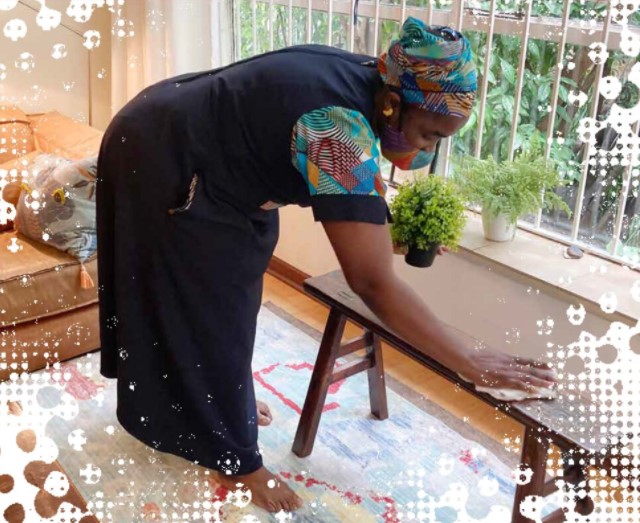
Feb 3, 2022
“The dignity of people’s very being is at stake,” said IZWI Domestic Worker Alliance’s founder and lead researcher Amy Tekie in opening remarks at a recent webinar focused on a new qualitative survey of human rights violations against live-in domestic workers in South Africa.

“Really awful things are happening behind closed doors,” said IZWI’s Amy Tekie.
“The Persistence of Private Power: Sacrificing Rights for Wages“—co-published by Johannesburg-based IZWI Domestic Workers Alliance and the Solidarity Center—surveys the constitutional and human rights of live-in domestic workers in South Africa. It describes how domestic workers’ rights to privacy, freedom of movement and children’s right to parental care are frequently sacrificed for wages in a sector underpinned by racism, sexism and classism. Resulting exploitation—largely invisible because of the private spaces in which it occurs—continues regardless of constitutional protections and industry-specific labor regulations.

We are expected to be indoors even when it is our off day,” said the survey’s lead field researcher Theresa Nyoni. Credit: IZWI
“We are not allowed to be seen around,” said the survey’s lead field interviewer, Theresa Nyoni, of a sectional title housing complex in which she was formerly employed as a domestic worker.
Nyoni described almost universally denied opportunities for live-in domestic workers in sectional title housing to enjoy open spaces on, or near, the employers’ property and lack of freedom to move around or receive visitors in their own quarters—even during off hours. And, for most live-in domestic workers, she noted invasive employer surveillance and almost total lack of privacy.
“We are sleeping with kids and not allowed to lock the door; parents barge into the room and even the bathroom,” she said.
Employers isolate domestic workers by routinely denying them visits from friends, spouses and children, and some domestic workers say they are not allowed to leave their employer’s home for any reason. Nyoni described her former employer’s refusal to allow her to leave the work premises, on her own time, to purchase and arrange for transportation of bulk food items to her own children during the pandemic.
“When I held a plate of food to eat, I was thinking: Did my children get food today?”
Survey interviewees outlined living conditions that Tekie described as “almost kidnapping [in its] constant and complete employer surveillance and control.” Besides being isolated from loved ones, many live-in domestic workers said they were denied employer permission to keep their infants with them, receive packages or use their employer’s kitchen to preserve and prepare their own food, and those employed in sectional title housing complexes reported repeated employer and security guard searches. Some live-in domestic workers said they have chosen abortions for fear of losing their jobs.
IZWI interviewed 115 mostly migrant live-in domestic workers for the survey, most of whom were working in or near Johannesburg—where working conditions are anecdotally better than those than in rural areas, said Tekie. Approximately half of South Africa’s more than 800,00 domestic workers live in by IZWI’s estimate, although definitive data does not yet exist, she said.
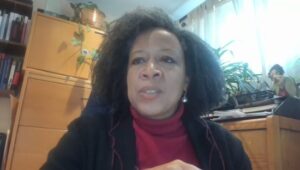
The survey affirms that state silence perpetuates the status quo, said McGill University Faculty of Law Professor Adelle Blackett.
McGill University Faculty of Law Professor of Transnational Labor and Development Adelle Blackett underscored the significance of the report being centered on the lived experience of domestic workers and the persistence of private power in their lives, even post-Apartheid.
Describing the report as “chilling,” Blackett defined the status quo for South Africa’s domestic workers as, “historicized, racialized, intersectionalized enslavement to domestic servitude.”
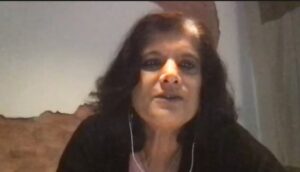
“[This report] is only the tip of the iceberg,” said former South African Labor Court judge Urmilla Bhoola.
“When domestic workers live in, they forfeit their rights,” she said. And so, civil society legal activism is essential, including that spearheaded by trade unions, she added.
Report recommendations include extension to domestic workers of many of the rights contained in South Africa’s farmworker Extension of Tenure Security Act (ESTA) but absent from Sectoral Determination 7 governing domestic work. ESTA guarantees to farmworkers residing on employers’ land “the right to human dignity”—including privacy, having family life, the freedoms of association, movement and religion, and to have visitors and receive postal communication.” Alternatively, concludes the report, legislation specific to the domestic work sector should be created that includes:
- Minimum housing standards for all live-in domestic workers, not only those paying rent
- Basic regulations on rights to family life and visitors, including the right for family to cohabit with a worker, within residential density laws, and the right for workers to have visitors in their homes
- Regulations to protect privacy, explicitly preventing employers from searching rooms, phones or property without permission
- Clear protection of a worker’s right to move freely during off hours
- Guidelines on bullying, harassment and assault, as those provided in the labor law do not address the specifics of the domestic sector
- Guidelines for provision of food.
Feb 3, 2022
“‘If you’ve got a race to the bottom, you’ve got to raise the bottom, and then maybe the race will slow down a little bit,’ said Jeff Hermanson, an official at the Solidarity Center.”
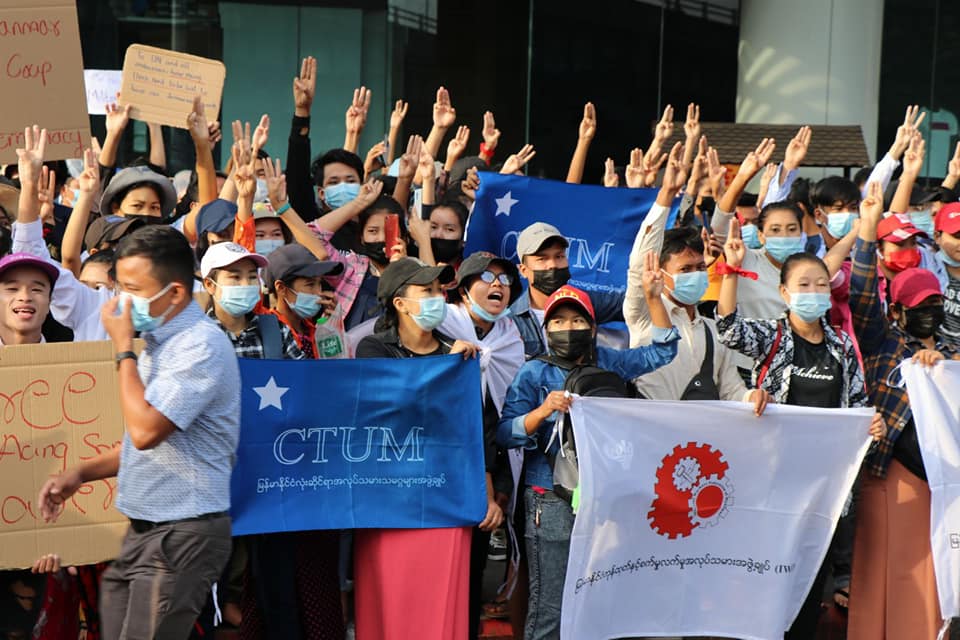
Feb 1, 2022
As Myanmar’s military junta marks the first year of its overthrow of the country’s democratically elected government February 1, delegates to a national unity assembly seeking to establish civilian control and return the country to democracy elected a five-member presidium that includes union leader Phyo Sandar Soe.
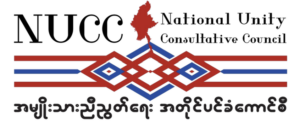 Nearly 400 delegates gathered virtually for the First People’s Assembly of the National Unity Consultative Council (NUCC), where they elected Sandar, assistant general secretary of the Confederation of Trade Unions Myanmar (CTUM). She is the only woman and is the youngest person elected to the presidium.
Nearly 400 delegates gathered virtually for the First People’s Assembly of the National Unity Consultative Council (NUCC), where they elected Sandar, assistant general secretary of the Confederation of Trade Unions Myanmar (CTUM). She is the only woman and is the youngest person elected to the presidium.
(Take action to support a return to democracy in Myanmar.)
Delegates to the January 27–29 assembly included a broad spectrum of political parties, civil society organizations, ethnic states and organizations calling for unity and support for the “Spring Revolution.”
In a statement, the assembly strongly condemned “the actions of the terrorist military junta that includes the widespread and deliberate arrest, torture and murder of innocent people … breaching international human rights laws which includes Geneva Conventions, crimes against humanity and war crimes and genocide.”
Myanmar Junta’s One-Year Record: Thousands Killed, Tortured
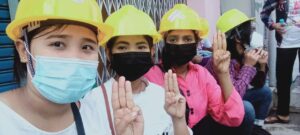
Workers–women in particular–took an early lead in the protests against the Myanmar coup, with the country’s 450,000 garment workers especially active. Credit: CTUM
An estimated 1,500 people have been killed since the military coup, and nearly 12,000 people imprisoned, most tortured. The military has especially targeted union leaders, arresting dozens, and many have fled the country or are in hiding. Workers–women in particular–took an early lead in the protests, with the country’s 450,000 garment workers especially active in organizing civil disobedience actions and shutting down factories. They have asked international corporate fashion brands to cease doing business in Myanmar until democracy is restored.
Workers today staged a silent strike across the country, to mark the anniversary in defiance of military brutality.
The assembly also is calling for the release of all political prisoners and protesters, and is urging the international community to recognize the National Unity Government (NUG) as the country’s only legitimate government. The NUG includes Aung San Suu Kyi, who headed Myanmar’s government before the coup and who has been arrested and jailed by the military junta.
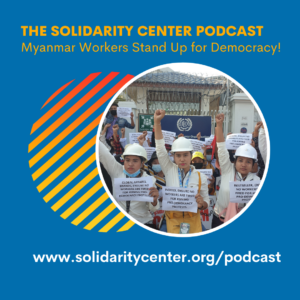 “We are facing a bloody crackdown, but all people protect each other. We are finding solutions to fight back,” Sandar said on a Solidarity Center Podcast last year.
“We are facing a bloody crackdown, but all people protect each other. We are finding solutions to fight back,” Sandar said on a Solidarity Center Podcast last year.
“That’s why I want to tell our brothers and sisters to endure this duration because we have very high motivation to fight back against the junta.” Sandar, a former garment worker, spoke from a safe house with podcast host and Solidarity Center Executive Director Shawna Bader-Blau.
Workers across the country are struggling to support themselves, as some 1.6 million jobs were lost in Myanmar in 2021, with women workers hit especially hard. Working hours are estimated to have decreased 18 percent in 2021 relative to 2020, equivalent to the working time of at least 3.1 million full-time workers. Nearly 800,000 people have been displaced and an estimated 14.4 million people, including 5 million children, are in need of humanitarian assistance.
Sharan Burrow, general secretary of the International Trade Union Confederation (ITUC), and Thomas Andrews, UN Special Rapporteur on the Situation of Human Rights in Myanmar spoke to delegates to convey their support.
‘Investing in Myanmar Means Fuels Military Brutality’
Union leaders in Myanmar have been urging international corporations to pull support from the government. “If you invest in Myanmar, your investment money will go to the military regime,” Sandar said on the Solidarity Center Podcast. “And then the military regime, with your money, they will keep controlling the country and they will buy guns and weapons, and then they will kill us.” Unions and other civil society organizations around the world, including the Solidarity Center, have backed a statement urging international brands not to invest in Myanmar.
“There’s no excuse for anyone who does business with this regime, and there’s no excuse for backing the bloodshed with weapons,” Burrow said on the anniversary of the coup. “That’s why we are calling on the UN Security Council to enforce an arms embargo on Myanmar and enforce the General Assembly’s resolution 75/287 with the member states.”
Two energy firms, Total Energies and Chevron announced last week they were pulling out of Myanmar, citing widespread human rights abuses and deteriorating rule of law. Yet many other multinational corporations have not withdrawn.
Together with the United Kingdom and Canada, the U.S. Department of the Treasury’s Office of Foreign Assets Control (OFAC) on January 31 announced financial sanctions against seven individuals and two entities connected to Myanmar’s military regime. The action follows similar U.S. sanctions imposed last year.
Despite the hardships, union activists and other NUCC members are standing up for the restoration of democracy and fundamental human rights, with the NUCC vowing to “continue the fight for the elimination of all forms of dictatorship including military dictatorship,” and build “a federal democracy union which fully guarantees democracy, national equality and self-determination with collective leadership and collective strength.”












 Nearly 400 delegates
Nearly 400 delegates 
